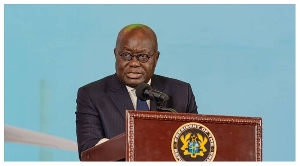Regional News of Friday, 18 June 2004
Source: GNA
Draft Wildfire policy document calls for sustainable approach
Ho, June 18, GNA - A national policy to give direction and change people's attitudes to adopt more sustainable approaches to minimise the incidence and impacts of wildfires in Ghana has become imperative, a draft policy document on the phenomenon has outlined.
This is because past experiences have demonstrated that wildfires cannot be managed through legislation, by-laws and annual launching of wildfire control and educational campaigns, which had been the case since 1934.
These observations were contained in the draft National Wildfire Policy document now under public discussion at a Southern Sector consultative workshop in Ho.
The workshop is being attended by some 49 public and private sector representatives from the Volta, Greater Accra and Eastern regions. It was organised by the Ministry of Lands and Forestry and the Forest Protection and Resource Use Management Project (FORUM) of the Volta Region and sponsored by the Governments of Ghana and the Netherlands. Topics being discussed included effective prevention and control of wildfire, guiding principles, policy goal and policy objectives, alternative resource management systems to minimise incidence of wildfire, incentives and reward systems in wildfire management and user focused research in wildfire management.
According to the document, such a policy will ensure consistency in the formulation of legislation and by-laws at all levels of governance to deal with the issues of wildfires and also respond to global concerns for environmental quality management as listed by International Conventions on environment including the Declaration in Rio de Janeiro, Brazil, in 1992.
The document noted that Ghana loses 24 million dollars annually from "merchantable" timber to wildfires and 210 million dollars being three percent of the country's Gross Domestic Product to such fires annually.
The 11-page document, authored by the Ministry of Lands and Forestry, traced the background of destructive wildfires to 1982/83, past initiatives in their management, constraints to their management and the development challenges they posed.
It also contained the new policy framework, its guiding principles, goals, objectives and strategies.
Other areas of attention were effective prevention and control of wildfires, alternative resource management systems to minimize the phenomena, incentives and reward systems, user focused research into the management of the menace and implementation arrangements.
Presenting the draft policy, Mr Joseph Osiakwan, Desk Officer of the National Wildfire Management Project at the Ministry of Lands and Forestry (MLF), said indigenous approaches to wildfire management needed to be researched to facilitate sustainable management.
He observed that any rigid measures to address the menace of wildfires would backfire if it fails to address the interests of the communities, hence the need to carry out extensive consultations on the best way forward.
In a welcome address read on his behalf, the Volta Regional Minister, Mr Kwasi Owusu-Yeboa said the country's wildfire policy must be coherent, pragmatic, workable, applicable and well focused. "As a people, we need to develop the ability, the consciousness, the commitment, the will and the readiness to manage wildfires effectively and efficiently in order that we can reduce the heavy negative impact of wildfires on our environment", he said.










